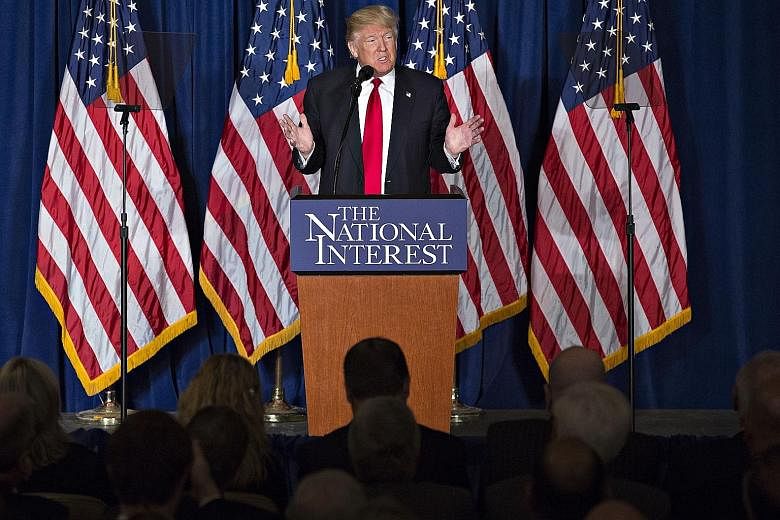Asian allies must pay "their fair share" for defence arrangements, Republican presidential front runner Donald Trump said in outlining his "America first" foreign policy approach on Wednesday, as his campaign closed in on the party's nomination.
Fresh from primary wins in five states on Tuesday, Mr Trump covered a broad sweep of issues, including trade, immigration and national security, in his speech, but emphasised that his foreign policy would "always put the interests of the American people and American security above all else".
While the speech sought to cast Mr Trump in a more presidential light, experts and politicians were quick to point out inconsistencies and warned of his oversimplification of global affairs.
Republican Senator Lindsey Graham, a former presidential candidate, tweeted that the speech was "pathetic in terms of understanding the role America plays in the world".
Mr James Schoff, senior associate of the Asia programme at the Carnegie Endowment for International Peace, said it was "so filled with inconsistencies, oversimplifications and delusion that it can't be taken seriously as a foreign policy platform".
In particular, experts said Mr Trump's speech sent mixed messages to US allies in Asia.
Doubling down on his position to withdraw US forces from military bases in Japan and South Korea if these countries do not shoulder more of the cost of stationing US military personnel there, Mr Trump said: "The countries we are defending must pay for the cost of this defence, and if not, the US must be prepared to let these countries defend themselves. We have no choice."
He later assured allies of American support and friendship if he were elected president.
"To our friends and allies, I say America is going to be strong again. America is going to be reliable again. It's going to be a great and reliable ally again. It's going to be a friend again," he said, while also suggesting separate summits for Nato allies and Asian allies to discuss the "rebalancing of financial commitments" and "new strategies for tackling our common challenges".
Sceptical of Mr Trump's ability to actually enact his policies, Mr Schoff warned that he could "try to bring back US forces" but that "would significantly weaken stability in the region and lead to big defence spending increases by all countries".
He added that "Japan and Korea already pay high portions of the costs to forward deploy US forces, and if they are told to spend more, then they will want to spend it on their own forces instead of Americans".
On US relations with Russia and China, Mr Trump said: "We have serious differences with these two nations, and must regard them with open eyes, but we are not bound to be adversaries. We should seek common ground based on shared interests."
He added that balancing the trade deficit with China would help the US achieve a position of strength.
"A strong and smart America is an America that will find a better friend in China, better than we have right now. Look at what China is doing in the South China Sea. They're not supposed to be doing it," he said.
But experts expressed doubt as to whether Mr Trump would be able to bring stability to the region.
"Any kind of 'deal' he would make with China would likely be tactical and economically focused, so the US would not be in a position to restrict its maritime expansion," Mr Schoff said.
He added that Mr Trump would try to cut short-term deals with China and Russia, "ultimately sacrificing long-term US strategic positions in their regions".
"Our friends in Asia, Eastern Europe and Central Asia would be forced to recalculate their policies and rely less on US support."
US election 2016: More stories online at: http://str.sg/Zjyq

